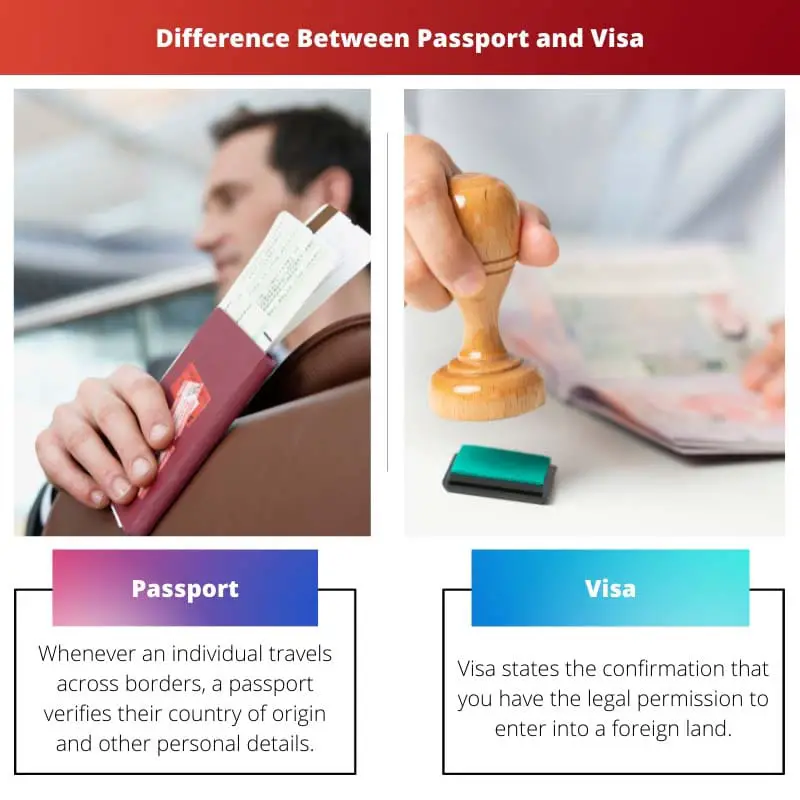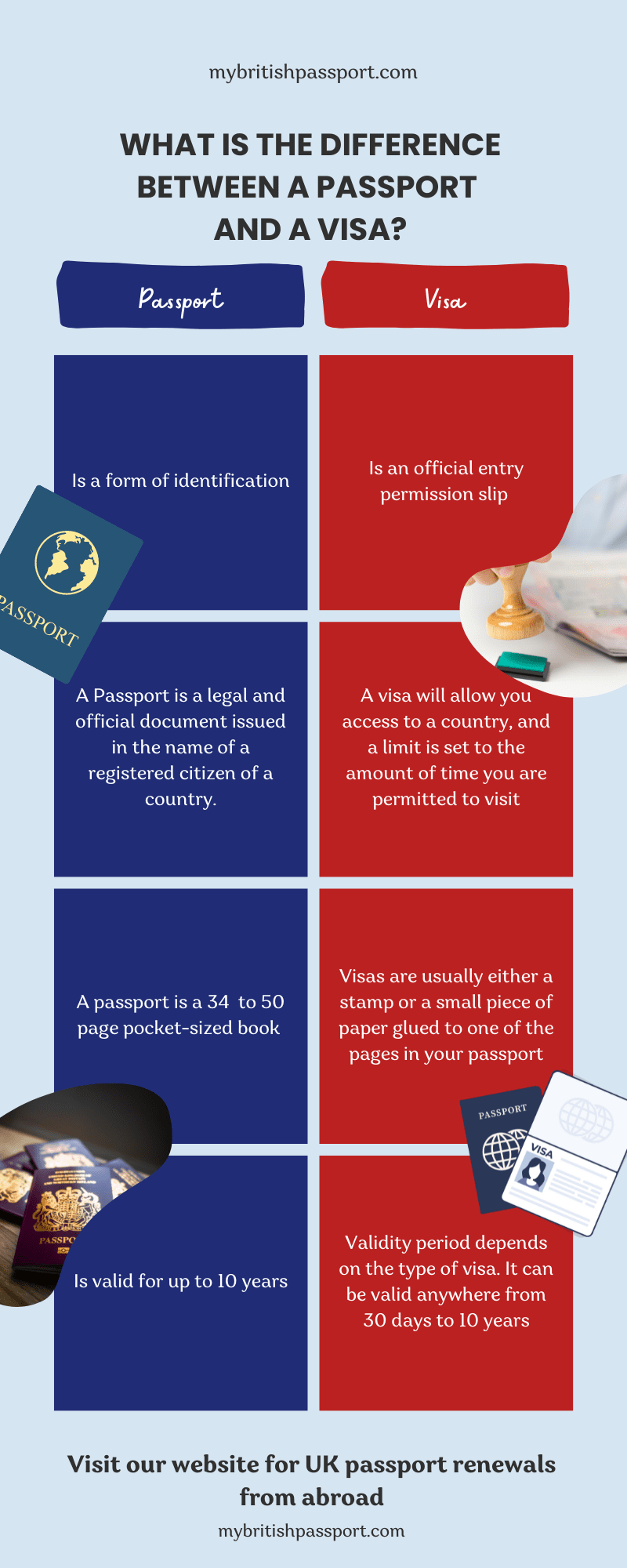Understanding The Key Differences Between Visa And Passport: Your Ultimate Guide
When it comes to international travel, understanding the difference between a visa and a passport is crucial. These two documents play distinct roles in enabling global mobility, and knowing how they work together can make your travel experience smoother and more efficient. Whether you're planning a short vacation or a long-term stay in another country, being well-informed about visa and passport requirements is essential.
Traveling abroad has become increasingly popular, with millions of people exploring new destinations every year. However, the legalities and documentation involved in crossing international borders can sometimes be confusing. This article aims to clarify the distinctions between visas and passports, ensuring that you are well-prepared for your next adventure.
By the end of this guide, you'll have a comprehensive understanding of the visa and passport difference, including their functions, requirements, and how they complement each other. Let's dive in!
Table of Contents
- What is a Passport?
- Types of Passports
- What is a Visa?
- Types of Visas
- Visa vs Passport: Key Differences
- Passport Requirements
- Visa Application Process
- Travel Tips for Visa and Passport
- Common Questions About Visas and Passports
- Conclusion
What is a Passport?
A passport is an official document issued by a country's government to its citizens, certifying their identity and nationality. It serves as a travel document that allows individuals to enter and exit foreign countries. Passports contain essential information such as the holder's name, date of birth, photo, signature, and unique passport number.
Passports are universally recognized and are required for international travel. They act as proof of citizenship and are often used in conjunction with visas for entry into certain countries.
According to the International Civil Aviation Organization (ICAO), passports must meet specific standards to ensure global consistency and security. This includes biometric features in modern passports, enhancing their reliability and preventing fraud.
Types of Passports
Ordinary Passport
The most common type of passport, issued to general citizens for personal travel purposes. It is used for tourism, visiting family, or business trips.
Diplomatic Passport
Issued to diplomats and high-ranking government officials for official travel. Diplomatic passports grant certain privileges and immunities under international law.
Official Passport
Also known as a service passport, it is provided to government employees traveling on official business. It is similar to a diplomatic passport but does not carry the same level of privileges.
What is a Visa?
A visa is an official endorsement or authorization granted by a foreign country allowing the holder to enter, stay, or leave its borders. Unlike a passport, which is issued by your home country, a visa is issued by the destination country. Visas specify the purpose of your visit, the duration of your stay, and any restrictions on your activities while in the country.
Visas are often affixed to a passport or issued electronically, depending on the country's regulations. They are essential for travelers visiting countries with strict immigration policies.
Types of Visas
Tourist Visa
Issued for leisure travel, allowing visitors to explore a country for a specified period without engaging in work or business activities.
Business Visa
Granted to individuals traveling for business purposes, such as attending conferences, meetings, or negotiations. It does not permit employment in the host country.
Student Visa
Required for those pursuing education in a foreign country. It allows students to enroll in academic institutions and may include part-time work permissions.
Work Visa
Issued to individuals who have secured employment in a foreign country. It typically requires sponsorship from an employer and may have specific conditions attached.
Visa vs Passport: Key Differences
The distinction between a visa and a passport lies in their purpose and issuance:
- Issuance: A passport is issued by your home country, while a visa is issued by the destination country.
- Purpose: A passport verifies your identity and nationality, whereas a visa grants permission to enter and stay in a foreign country.
- Duration: Passports are valid for several years, while visas have specific validity periods based on the type and purpose of travel.
- Function: A passport is a universal travel document, while a visa is country-specific and tied to the regulations of the issuing nation.
Understanding these differences is crucial for planning your international travel effectively.
Passport Requirements
Obtaining a passport involves meeting specific requirements, which may vary slightly depending on the country:
- Submit a completed application form.
- Provide proof of citizenship, such as a birth certificate or naturalization certificate.
- Include a recent passport photo that meets the prescribed standards.
- Pay the application fee, which can vary based on the type of passport and expedited services.
It's important to apply well in advance of your travel plans, as processing times can vary. Some countries offer expedited services for urgent travel needs.
Visa Application Process
Applying for a visa typically involves the following steps:
- Research the visa requirements for your destination country.
- Complete the visa application form, either online or in person.
- Gather necessary documents, such as a valid passport, proof of travel plans, and financial statements.
- Attend an interview at the embassy or consulate, if required.
- Pay the visa fee and await the decision.
Processing times can vary depending on the country and type of visa. It's advisable to apply early to avoid last-minute complications.
Travel Tips for Visa and Passport
Here are some practical tips to ensure a smooth travel experience:
- Always check the validity of your passport and visa before traveling. Ensure your passport is valid for at least six months beyond your travel dates.
- Keep copies of your passport and visa in a secure location, both physically and digitally, in case of loss or theft.
- Understand the entry and exit requirements of your destination country to avoid any legal issues.
- Stay informed about any changes in visa policies or travel restrictions that may affect your trip.
Being prepared and organized can significantly enhance your travel experience.
Common Questions About Visas and Passports
Do I Need a Visa for Every Country?
No, some countries have visa-free or visa-on-arrival agreements with others, allowing travelers to enter without prior visa approval. However, it's essential to verify the entry requirements for each destination.
Can I Renew My Passport While Abroad?
Yes, many countries allow their citizens to renew passports at embassies or consulates abroad. Contact your embassy for specific procedures and requirements.
What Happens if My Visa is Denied?
If your visa application is denied, you may appeal the decision or reapply after addressing the reasons for rejection. It's important to understand the denial grounds and improve your application accordingly.
Conclusion
In summary, understanding the visa and passport difference is fundamental for successful international travel. A passport serves as proof of identity and citizenship, while a visa grants permission to enter and stay in a foreign country. Both documents work hand-in-hand to facilitate global mobility.
We encourage you to share this article with fellow travelers and leave your thoughts in the comments below. For more insights on travel documentation and tips, explore our other articles. Happy travels!


